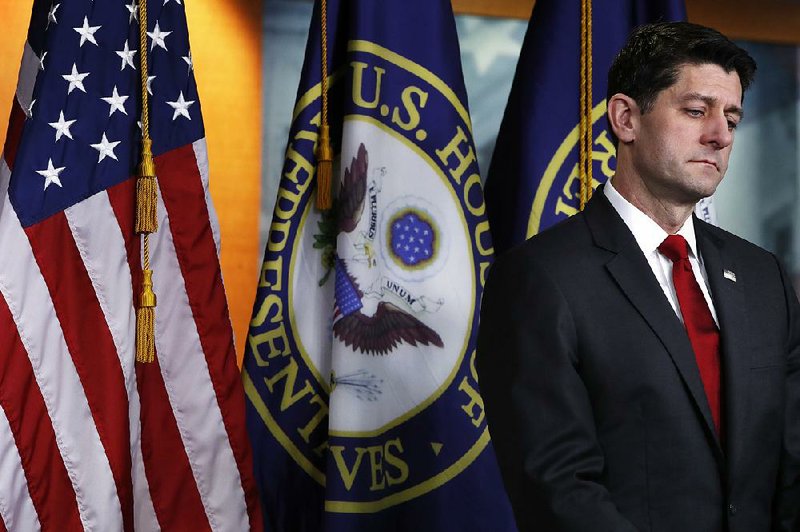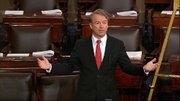WASHINGTON -- The government stumbled into a midnight shutdown Thursday as a rogue Senate Republican blocked a speedy vote on a bipartisan budget deal, protesting the return of trillion-dollar deficits on the watch of Republicans controlling Washington.
The shutdown -- technically a lapse in agency appropriations -- became inevitable as GOP Sen. Rand Paul repeatedly held up votes on the budget plan, which is married to a six-week, governmentwide spending measure. The Senate recessed around 11 p.m., reconvening just after midnight. A vote was expected later.
Meanwhile, Office of Management and Budget Director Mick Mulvaney issued the shutdown order at midnight, notifying federal agencies they should execute their contingency plans.
Mulvaney's notice said federal employees should report to work today to "undertake orderly shutdown activities."
Paul held up voting on the broad measure in hopes of obtaining a recorded vote on reversing its spending increases.
"I ran for office because I was very critical of President Obama's trillion-dollar deficits," the Kentucky senator said. "Now we have Republicans hand in hand with Democrats offering us trillion-dollar deficits. I can't in all honesty look the other way."
While the government's authority to spend some money expired at midnight, there weren't likely to be many clear immediate effects. Essential personnel would remain on the job regardless.
Paul delayed the vote for hours with a demand to hold a vote on an amendment.
"The reason I'm here tonight is to put people on the spot," Paul said. "I want people to feel uncomfortable. I want them to have to answer people at home who said, 'How come you were against President Obama's deficits and then how come you're for Republican deficits?'"
He showed no sign of relenting, delivering a floor speech in which he bemoaned out-of-control government spending.
"I think the country's worth a debate until 3 in the morning, frankly," he said.
The deal was expected to sail through the Senate, and the House planned to vote on it later Thursday, until Paul took his stand.
The shutdown is the second of the year, coming after a three-day closure last month that took place after the vast majority of Senate Democrats and a handful of Republicans, including Paul, blocked a bill that would have kept the government open.
This time around, Senate leaders from both parties nudged Paul to stop holding up the vote.
"It's his right, of course, to vote against the bill, but I would argue that it's time to vote," said Sen. Mitch McConnell, R-Ky., the majority leader.
His Democratic counterpart, Sen. Charles Schumer of New York, echoed the sentiment. "We're in risky territory here," Schumer warned.
Before Paul waged his assault on the budget deal, trouble was already brewing in the House, where angry opposition from the Republicans' most ardent conservative members, coupled with Democratic dissenters dismayed that the deal does nothing for young illegal aliens in the country, was creating fresh tension as the clock ticked toward midnight.
Rep. Nancy Pelosi of California, the Democratic leader, told a private meeting of House Democrats that she would oppose the deal, and said Democrats would have leverage if they held together to demand a debate on immigration legislation. But she suggested she would not stand in the way of lawmakers who wanted to vote their conscience.
"I'm pleased with the product; I'm not pleased with the process," she said Thursday at a news conference. Asked whether she's pressing House Democrats to vote against it, Pelosi said, "I'm just telling people why I'm voting the way I'm voting."
Pelosi is under intense pressure from immigrant activists and liberals in her caucus to take a stand for the "Dreamers," illegal aliens brought to the country as children who face losing work permits granted by former President Barack Obama's Deferred Action for Childhood Arrivals program, or DACA, which expires next month.
Such aliens are often called Dreamers, after the never-passed Development, Relief, and Education for Alien Minors Act, or DREAM Act, that would have given protections similar to those provided by the deferred-action program.
But many House Democrats were skittish over forcing another shutdown after the last one failed to yield much, especially with Senate Democrats largely on board for the spending deal. Schumer negotiated the package with McConnell, with input from Pelosi and House Speaker Paul Ryan, R-Wis.
"It's split in there, but not everybody has expressed their point of view," one lawmaker, Rep. Jackie Speier, D-Calif., said as she left the House Democrats' meeting late Thursday.
The deal contains far more money demanded by Democrats than had seemed possible only weeks ago.
"We're not going to get DACA as part of this," said Rep. John Yarmuth of Kentucky, the top Democrat on the Budget Committee. "So if we can negotiate a deal like I think we've gotten that essentially meets every other one of our priorities, then I think that's where a lot of the Democrats are."
Added conservative Democrat Henry Cuellar of Texas: "It's an easy 'yes.'"
Some House conservatives balked, objecting to the enormous increase in federal spending, most of which would be piled onto the deficit with minimal attempts to offset it.
The conservative House Freedom Caucus, which has roughly three dozen members, formally opposed the deal on Wednesday night.
"It was pretty much a smorgasbord of spending and policy that got added to this," said Rep. Mark Meadows, R-N.C., the chairman of the Freedom Caucus. "Normally, people who eat at smorgasbords all the time are not the healthiest."
Republicans were sheepish about the bushels of dollars for Democratic priorities, but some pointed to money they have long sought for the Pentagon, which they say needs huge sums for readiness, training and weapons modernization.
"There is widespread agreement in both parties that we have cut the military too much, that our service members are suffering as a result, and that we need to do better," Ryan said.
"It provides what the Pentagon needs to restore our military's edge for years to come," he said.
Beyond $300 billion worth of record increases for the military and domestic programs, the agreement adds $89 billion in overdue disaster aid for hurricane-slammed Texas, Florida and Puerto Rico, a politically charged increase in the government's borrowing cap and a grab bag of health and tax provisions. There's also $16 billion to renew a slew of expired tax breaks that Congress seems unable to kill.
Cotton growers and dairy farmers would get relief courtesy of the bipartisan leadership of the Senate Appropriations Committee, while popular funding for community health centers would be extended for two years, among myriad health provisions. McConnell won a break for tiny Berea College in Kentucky, exempting it from a new tax on its endowments that was part of last year's GOP tax bill.
"I love bipartisanship, as you know," said Sen. Jeff Flake, R-Ariz. "But the problem is the only time we discover bipartisanship is when we spend more money."
Combined with the Republicans' December tax cut bill, the burst in military and other spending would put the GOP-controlled government on track for the first $1 trillion-plus deficits since Obama's first term and the aftermath of the most recent recession nine years ago.
"This budget deal shows just how broken the budget process is, that Congress thinks the only way to agree to a budget is to put hundreds of billions of dollars on the nation's credit card," said Maya MacGuineas, president of the Center for a Responsible Federal Budget, a Washington-based group that advocates for fiscal discipline.
Sen. Bob Corker, R-Tenn., said the measure amounts to "doubling down on the irresponsible mentality in Congress of spend-now-pay-later."
The deal is a framework that repeals tight budget "caps" from a failed 2011 budget agreement, but the spending won't take effect until Congress passes a follow-up omnibus appropriations bill that will take weeks to negotiate.
The agreement would increase the government's borrowing limit to prevent a first-ever default on U.S. obligations that looms in just a few weeks. The debt limit would be suspended through March of 2019, putting the next vote on it safely past this year's midterm elections.
The Congressional Budget Office says that over 10 years, the budget deal would increase the deficit by $38 billion, counting only "direct spending and revenue," but that figure doesn't consider budget cap adjustments.
The nonpartisan Committee for a Responsible Federal Budget, analyzing the budget office's report, said the deal would add a net $320 billion to deficits over a decade, or $418 billion counting the additional interest costs.
Information for this article was contributed by Andrew Taylor, Matthew Daly, Alan Fram, Jill Colvin and Richard Lardner of The Associated Press; by Thomas Kaplan of The New York Times; by Mike DeBonis, Erica Werner, Ed O'Keefe and Damian Paletta of The Washington Post; and by Sahil Kapur, Erik Wasson, Arit John, Laura Litvan, Billy House and Steven T. Dennis of Bloomberg News.
RELATED ARTICLES
http://www.arkansas…">House OKs budget deal, ending shutdownhttp://www.arkansas…">Arkansas senators say they will back budget bill
A Section on 02/09/2018



